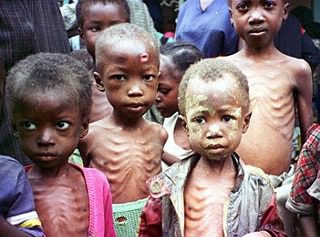National Issues
Malnutrition and child mortality in Nigeria -By Tayo Ogunbiyi


Malnutrition, which is simply a state of being under-nourished, is usually associated with people living under severe circumstances. It often occurs as a result of natural disasters, wars, or from living in underdeveloped parts of the world. During the Great Depression, malnutrition was of the leading health issues. Victims of malnutrition are easily vulnerable to ill-health.
It is important to stress that malnutrition is not actually the same thing as hunger. It is a condition that arises from insufficient calories or nutrients intake. Child nutrition and malnutrition could be a major threat to the population of any society as well as to the much-needed intellectual competence in major disciplines which are existing and potential motivating forces for speedy and sustainable socio-economic growth. Its symptoms include weight loss, tiredness, dizziness, brittle nails, constant diarrhea, slow wound healing, bone or joint pain and confusion. Children may become extremely thin, have stunted growth or have a swollen gut.
In Nigeria, the malnutrition situation, especially among children, is quite alarming. According to a UNICEF 2015 report, about 1.7 million severely underfed children are in ominous need of treatment in Nigeria. Experts have, indeed, revealed that malnutrition is a principal cause of death among children in the country. The problem with malnutrition in children is that it leads to diarrhea-related problems which make most children to lose immunity thereby making them vulnerable to any disease attack. Generally, when a child loses immunity, the possibility of losing such a child is high.
It is this state of affairs that is partly responsible for the high infant mortality rate in Nigeria. A recent Federal Government study affirms that a great proportion of Nigerian children experience defective growth as a result of malnutrition. Similarly, a data from the Summary of Findings of National Nutrition and Health Survey conducted from February 9 to May 5, 2014, showed that Nigeria has a stunting incidence of 32 per cent among children that are under five years and about 21 per cent underweight. Another report says that the proportion of children, who are wasted, or too thin for their height in the country, has progressively increased in recent years.
Experts have equally revealed that about four out of five Nigerian children fall below the WHO’s approval for exclusive breastfeeding during the first six months of life, while 70 per cent of children ages six to 23 months are not receiving the minimum suitable diet. According to a UNICEF data, 1.1million Nigerian children are in danger of adverse malnutrition. Another report has revealed that chronic malnutrition is rampant among children in the northern parts of the country. This, of course, has adverse effects on the learning ability of the children. Having been established that poor nutrition negatively affects the mental development and intellectual capacity of children, it should not be startling that we presently have poor educational culture in the country.
As previously stressed, malnutrition occurs as a result of too little food or a diet lacking in nutrients, but it could also be caused by a variety of other factors which could be physical, social or psychological. Naturally, aged people often have health challenges that often lead to declined appetite. Some crucial phases of life like infancy, childhood, adolescence, pregnancy and old age require additional nourishment than others, and people in these groups might be at a higher risk. Surgery, trauma, infections, burns and chronic diseases can equally affect nutritional needs and increase the chance of malnutrition.
Other crucial causes of malnutrition could be a chronic illness, use of definite medications, difficulty swallowing or absorbing nutrients, a recent hospitalisation, or a weakened sense of taste or smell. Equally, dietary restrictions such as limits on salt, fat, protein or sugar intake, tough could help manage certain medical conditions, but might also contribute to malnutrition. Grief, loneliness, failing health, too much alcohol may contribute to depression leading to a loss of appetite.
For anyone having issues with malnutrition, the first rational thing to do is to go for blood tests. One of the tests is a test of blood sugar. It is, however, essential to state that, perhaps, the most important thing to do is to identify and restore lost nutrients. A good balanced diet would ensure that the body does not, in any way, suffer from malnutrition.
Good nutrition is critical to the overall health and well-being of every human being. And unlike what many erroneously believe, it does not actually cost so much to imbibe a consistent balanced diet culture. What is really essential is for everyone to, first and foremost, appreciate the necessity for a balanced diet. Therefore, it is imperative for all and sundry to have a modest knowledge of why we eat what we eat, knowing the health benefits that various foods possess, how they affect our bodies, and how our bodies react when these types of foods become insufficient.
Malnourishment is not about the quantity of food a person eats, but actually about the nutritional quality of what he eats. A person can eat relentlessly, be obese, and still be malnourished, because the idea of proper nourishment is really about giving the body what it requires to function appropriately. Consequently, a malnourished person may need to steadily boost calories intake through numerous little meals at regular intervals during the day. Additionally, dietary supplements, or liquid nutrition, may be needed, depending on the level of the malnutrition. In severe cases, hospitalisation could be necessary.
One measure to stop malnutrition is by giving micronutrient supplements and de-worming as well as behavioural changes such as cleanliness, immunisation and complementary feeding. Perhaps, more importantly, especially in view of the magnitude of the challenge posed by malnutrition in the country, the Federal Government through its relevant MDAs must continue to collaborate with all major stakeholders in order to effectively deal with the problem of malnutrition. This could involve strategic use of communication for development as a vehicle to drive public enlightenment campaigns and achieve expected behavioural change. Equally, the Health and Information organs of all state and local governments in the country need to come up with the required enlightenment strategies that could speedily stem the tide of malnourishment in the country.
It is key to commend the recent partnership between UNICEF and the Federal Government which gave birth to a community-based management of acute malnourishment for severely malnourished children in 11 northern states. It is, however, essential that the necessary funding that is needed to properly drive the initiative is adequately provided. This is particularly necessary in view of the not too exciting reports that that two out of every three children in the 11 northern states presently getting CMAM have yet to receive the treatment because of lack of funds. It would, however, not be out of place for corporate bodies and other well-meaning individuals come up with such similar initiatives. The Bill Gates polio initiative is a pointer to the fact that nothing should be spared in upholding the sanctity of life. This is the only investment that endures forever.
Ogunbiyi is of the Features Unit, Lagos State Ministry of Information and Strategy, Alausa, Ikeja.
















